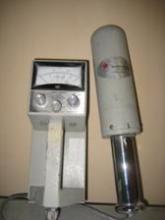A neutron probe is a sophisticated and accurate piece of equipment, requiring calibration and operation by a licensed operator.
The neutron probe comprises;
• a nuclear unit, suspended on a cable, which is both a neutron source and detector
• a housing containing the electronic receptors
• a shield for safe transportation of the radioactive device
The nuclear unit is lowered down a stopped aluminium access tube to set depth intervals. The neutron source starts scattering fast neutrons, which are deflected by hydrogen, most commonly water, and are slowed. The source also detects and counts the returning slow neutrons. The amount of deflection is directly related to the soil moisture in the soil.
The advantages are:•
Ø Accurate in determining soil moisture
Ø Large sphere of influence
Ø Not affected by temperature, soil type or pH
Ø Measurements are interpreted by the Contractor and provided back to you
Ø Access tubes installed with minimal soil disturbance
Ø Trained consultant does readings for you
Ø Reports and advice given by an Irrigation consultant who is familiar with your property
Disadvantages:
Ø Costs of service and set-up on-farm
Ø Licenses required to take readings (radioactive source), hence you are unable to take a reading at will
Ø Costs of service and set-up on-farm
Ø Clear access to property and sites required at all times • Access tubes may become compacted
Ø Slight delay in receiving readings/

